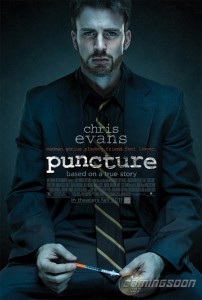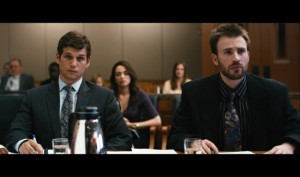Interview: Adam and Mark Kassen of ‘Puncture’
Posted on September 28, 2011 at 8:00 am
 Brothers Adam and Mark Kassen co-produced and co-directed “Puncture,” the true story of an idealistic but drug-addicted young lawyer from Houston who took on the mammoth pharmaceutical companies on behalf of a quirky inventor who came up with a simple and inexpensive new life-saving technology to prevent health care workers from being infected by used syringes. Because the big companies did not own the retractable syringe technology, they would lose revenues, so they fought to keep it out of hospitals. Chris Evans (“Captain America”) plays Mike Weiss, the young lawyer, and in addition to co-producing and co-directing, Mark Kassen plays his law partner Paul Danziger. The cast also includes Jesse L. Martin (“Law & Order, ” “Rent”), Michael Biehn (“Terminator”), and Kate Burton (“Law & Order”).
Brothers Adam and Mark Kassen co-produced and co-directed “Puncture,” the true story of an idealistic but drug-addicted young lawyer from Houston who took on the mammoth pharmaceutical companies on behalf of a quirky inventor who came up with a simple and inexpensive new life-saving technology to prevent health care workers from being infected by used syringes. Because the big companies did not own the retractable syringe technology, they would lose revenues, so they fought to keep it out of hospitals. Chris Evans (“Captain America”) plays Mike Weiss, the young lawyer, and in addition to co-producing and co-directing, Mark Kassen plays his law partner Paul Danziger. The cast also includes Jesse L. Martin (“Law & Order, ” “Rent”), Michael Biehn (“Terminator”), and Kate Burton (“Law & Order”).
I spoke to Adam and Mark about the movie and about why so many successful Hollywood teams are brothers.
This is such a powerful story. What message do you want this movie to carry about the role of corporations in healthcare?
Mark: Adam and I are focused primarily on the movie’s mission and the more it can get out there we hope it will connect to a larger conversation.
Adam: We’re not investigative reporters. This is a film, not a documentary. It is entertainment. But we hope that it has a larger message. We hope people will watch it as entertainment and then start a conversation afterwards.
There’s kind of a connection between your flawed hero, who is addicted to drugs, and the industry he takes on, which is addicted to money and power.
Mark: That’s a cool analogy. It’s an addiction to money, an extra $40 billion that gives nothing back to the industry, growing itself at any cost. And a drug addict will get high at any cost. It’s a more fertile ground to an already-burgeoning problem.
Adam: These group purchasing organizations run by the health care industry started out with good intentions. It was a more streamlined way to get the products to hospitals at the best price. But that became, like almost everything else in the health care industry, guided by the profit motive. It turned into the opposite, squeezing out products that doctors want and nurses want, but because of politics, money, and corporations they cannot get them.
You assembled a remarkable cast. 
Mark: Adam’s been trying to get me for a long time. I had my mom do the negotiation.
Adam: He had so many demands, a big trailer…
Mark: Adam agreed to give me the part if I finally told him he was right. Well, first and foremost, we had to get the right actor to play Mike. We were introduced to Chris Evans by a mutual agent. We had seen “Sunshine,” the Danny Boyle film, which he was great in. And whatever he was in, he is always great. We wanted somebody for that role who would have a sense of tragedy but not self-indulgent but dynamic, charismatic, exciting.
Adam: Like the real guy was. Chris is this multi-layered actor and he knocked it out of the park. We cast around him with really great actors. Jesse L. Martin is a good friend of ours and did it to help us out and because he was excited about the material. Kate Burton (who plays the Senator) came down for a day.
Mark: There are upsides and downsides to making a small movie like this. Once we got Chris, we that means you have just this much money to get the movie made. So, people say, “this guy plays a second lead on that TV show, so he’s worth this much money,” and we didn’t do that. With our casting directors, we were able to get just good actors, the best we could. Brett Cullen is actually from Houston. The last scene in the movie, the camera shoots out the window, you can see the Cullen building. In Houston we got so many great local actors. We were surprised by how many people we could get from the area.
For a lawyer who appears in court, Mike was a very flamboyant dresser.
Adam: We talked to so many people who knew Mike, opposing counsel, judges, people he went to high school with and one of the most consistent through-lines beside his brilliance was the way he dressed, where he had them tailored, where he bought them. There were all these stories about his suspenders and wild colored shirts and how he thought he was the Man!
It’s surprising how many brother teams there are in Hollywood today — the Coens, the Farrellys, the Wachowskis. What is it about the brother relationship that works in film-making?
Adam: We’re used to being around each other.
Mark: In all honesty, if making a film is all about communication, you’re used to being able to communicate with each other on an intimate level and that gives you a good start.
Adam: There’s a lot of debate and conversation and exploration involved, in a good way, with the actors, the editors, the DP. Being brothers, we’ve been debating for a long time, and if you are friends as brothers that means you have done it successfully. Being on a film set is stressful at times, but no more stressful than doing the dishes together after dinner with your parents. You’re used to debating in that high-stress environment. And you know each other so well. You recognize that look that’s been making you angry since you were 10 years old that someone else might not notice. But it’s over very quickly as well, so arguments don’t resonate. We have similar creative sensibilities and that really helps. And we have that basic level of trust.



